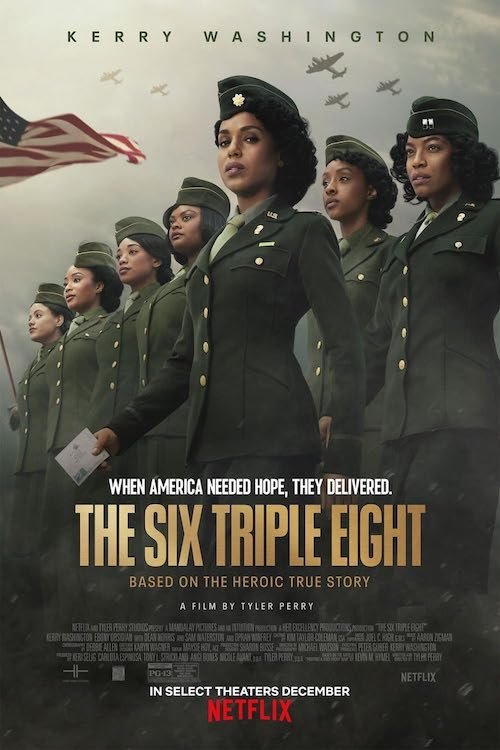The Six Triple Eight
Written by Andreas Babiolakis
I usually wouldn’t trust Tyler Perry with a serious drama if my life depended on it, because the filmmaker, actor, writer, producer is best known for films I cannot stand. The Madea comedies, for instance, are awful. I know there is an audience for his films, but I am not within it. I find his humour obvious and dated, his characters have zero restraint, and his themes are laid on super thick without room for thought. This brings us to The Six Triple Eight: a war drama that is unlike most of Perry’s career. We follow the titular postal delivery battalion unit — one that is made up entirely of Black women — and their efforts to restore order to a mailing system that is severely backed up during the Second World War. Major Charity Adams (Kerry Washington) helps lead her division, despite the racist and sexist backlash they face (including being neglected and ignored, despite their training and best efforts).
General Halt (Dean Norris) is one of those bigots who won’t let the 6888th Battalion thrive like they can, especially since army efforts and funding are going towards the World War and not helping get the delivery system back underway. Throughout The Six Triple Eight, we see a handful of subplots that drill home the points that this battalion is great at what they do, and that communication is essential especially during the biggest war in history. I won’t pretend that The Six Triple Eight is a half-assed effort by Perry who has been known to dial it in, but I do think that this countless films that aren’t well made are bad practice, making this well-intentioned effort just not work as well as it should. It’s incredibly cheesy and heavy handed, with the majority of the film feeling like the ending of a better structured motion picture (to save these feelings and tones for the ending makes a film triumphant; to weigh down almost every scene with this kind of oomph is exhausting).
The Six Triple Eight misses the mark by turning its inspirational story into a typical, cliched film.
So much about this film feels strenuous, from Washington’s forced acting and over-the-top annunciations, to numerous subplots that come and go (without ever feeling fully realized). The Six Triple Eight tries to take on so much without accomplishing enough of what it sets out to fulfill. I wish we got to know the strong women of this unit more than we do. I feel like a more bare-bones approach to this film would have sufficed, instead of the kitschy, artificial motion picture we do get. The music feels typical. The dialogue feels like we’ve heard almost every cue before, with every expected line included (I found myself predicting lines from time to time, and I know you will, too). Even the Diane Warren song — which is likely why most people will be watching it in the next few months (all the Oscars death race participants trying to catch every nominated film, and we know by now Warren will be included yet again) is fine but, once again, obvious and stale (although decently pretty).
Overall, The Six Triple Eight isn’t the worst film, but it definitely deserved to feel more raw, pure, and authentic than this, especially given the importance, relevance, and brilliance of the real circumstances that inspired this motion picture. This won’t feel as much like a history lesson as much as it will a checklist of every obvious idea and technique to use in a mediocre historical drama, which is never a good sign.
Andreas Babiolakis has a Masters degree in Film and Photography Preservation and Collections Management from Ryerson University, as well as a Bachelors degree in Cinema Studies from York University. His favourite times of year are the Criterion Collection flash sales and the annual Toronto International Film Festival.






